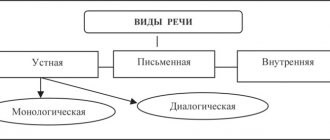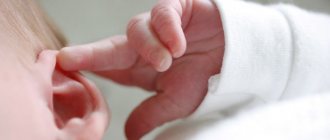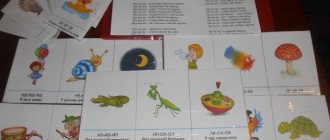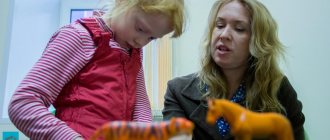Stages of speech development in children from birth to school
Language abilities are undoubtedly inherent in humans, but are not yet expressed in the newborn. Language acquisition adheres to some general, universal patterns. However, without an environment that provides language modeling and interaction, a child does not develop the ability for the language he or she is born with. Language development gives a start to a child's life, although expressive language will not emerge until a few months after birth. However, by the time a child reaches 5 years of age, his or her vocabulary will include several thousand words.
| 0-2 months | Newborn babies just scream. |
| 3-4 months | A buzz appears. |
| From 6 months | The baby begins to babble, knows his name, and enjoys playing clap, magpie-crow, and horned goat with his mother. |
| 1-1.5 years | Says the first conscious words. |
| After 1 year | Gradually, the vocabulary expands and pronunciation improves. Up to 3-4 years of age, mistakes are normal. Children may incorrectly generalize words, reduce them to a single stressed syllable, or rearrange syllables. |
| After 3 years | Simple and complex sentences appear in the child's speech. At 3-4 years old you can have a dialogue with your child. Children at this time often speak hastily and excitedly. |
| 5 years | The child's vocabulary expands significantly. He can retell, compose rhymes, pronounce words correctly. |
The development of speech in preschool children should culminate in good mastery of their native language and sufficient vocabulary. Unfortunately, not all children master this. Therefore, educational standards for kindergartens and development centers place the main emphasis on speech formation.
Psychological characteristics and stages of speech formation in preschool children
In the first years of life, the child develops mentally and physically, learns to control his body, think, and masters his native language. The formation of speech occurs sequentially; different age intervals have their own norms.
The ability to speak is an acquired skill that is developed in all children according to a similar scenario. In order to promptly notice deviations in speech development, it is necessary to know the patterns of mental maturation at an early age.
How a child’s speech is formed from birth to 3 years
In the first year after birth, all systems of the newborn actively develop: the structure of the brain matures and becomes more complex, phonemic hearing is formed, and the speech apparatus is trained during crying or involuntary sounds.
Stages of child speech development.
What is the initial stage based on:
- listening to everyday sounds, spoken speech and one’s own voice;
- imitation of an adult (repetition of heard sounds, syllables, and, at the age of about 12 months, words);
- the basics of understanding the meaning of what was said (mainly through emotions, intonation and facial expressions);
- the state of the articulatory apparatus (determines coherence in pronunciation, mobility of speech organs).
In the second year of life, there is a leap in the development of active speech.
The following is typical for communication at this age:
- attempts to use words meaningfully (to name an object);
- up to 1.5-1.8 years there are no common sentences, they are replaced by 1 word (“Drink” as a request);
- at 1.8-2 years the composition of phrases expands, but there is still no grammatical connection between words;
- vocabulary increases (100-300 words depending on the conditions, frequency and quality of communication with adults);
- the development of articulatory organs continues, but the voice has not yet become stronger;
- intonation is mastered;
- individual sounds are pronounced incorrectly (vowels are softened, consonants are skipped, syllables are confused), words are simplified (“Beep” instead of “Machine”).
Development of child speech from 3 to 4 years old
In the third year of life, the cognitive function of speech increases. The child becomes interested in the world around him, begins to ask simple questions, and engages in dialogue with peers.
The speech development of a three-year-old child includes the following stages:
- vocabulary is enriched (2-3 times compared to two years of age);
- verbs are used more often (up to 30% of the active vocabulary), prepositions and pronouns;
- there are errors in agreeing the gender of adjectives for naming objects;
- complex non-conjunctive sentences appear in speech (by the end of 3 years - complex sentences);
- listening comprehension of children's literature improves;
- the speech apparatus becomes mobile, but speech coherence and voice volume remain weak;
- when pronounced, long words with a complex structure are often shortened, syllables are swapped or dropped out;
- memory improves, creative thinking and imagination begin to develop;
- attention remains unstable, the child is distracted.
Interest in surrounding objects stimulates the preschooler to communicate with adults and be the first to start a conversation. In dialogue, the child learns to reason and begins to determine the simple relationship between phenomena.
What features of speech development distinguish the 4-year stage:
- the ability to select names for any objects or actions increases, including those that do not constantly surround the child;
- the arsenal of words is expanding (adjectives, numerals, adverbs, pronouns are actively used);
- retelling events or someone else's speech, talking about one's impressions remain inaccurate due to the inability to correctly choose the right words;
- illogicality and inconsistency of presentation remain, but the grammatical structure of speech improves;
- communication remains situational, requires clarification, the story is tied to the situation;
- memorization of poems, riddles, fairy tales improves, the child easily repeats them, but mostly does not understand the meaning;
- the speech apparatus is improved at an individual pace (by the end of 4 years, children can already speak clearly, intelligibly, or continue to simplify sounds).
Development of speech in a 3-4 year old child.
Formation of speech skills in children from 4 to 5 years old
At the age of five, a preschooler becomes receptive to the social environment. There is an interest in the development of speech hearing through word creation, attempts to rhyme or singing. The formation of speech occurs intensively, the child imitates the manner of communication in the family or kindergarten.
What stages of speech development do 5-year-old children go through:
- the colorfulness and variety of speech increases (in addition to the names of objects, the child knows their signs and is able to logically connect several objects with each other, relying on properties);
- attention does not dissipate, becomes stable;
- the vocabulary is replenished to 2.5-3 thousand words, which stimulates the development of monologue skills, but increases the number of errors and inconsistent phrases in speech;
- the speech organs are sufficiently trained for correct pronunciation, the coherence and clarity of sounds improves, speech becomes understandable to strangers and other children;
- in 30% of cases there are difficulties in pronouncing the sounds r, l, hissing;
- phonetic hearing develops, the ability to distinguish the subtleties of pronunciation (voice pitch, timbre, intonation, tempo).
Features of speech development of a preschooler aged 5-7 years
Children of senior preschool age master coherent speech and compose a monologue from complex sentences and extended phrases. People around you understand the child without further questions.
Signs of the formation of contextual speech in children 6 years old:
- abstract logical thinking develops, understanding of connections and relationships between phenomena, objects, people improves;
- the vocabulary is replenished with forms of already familiar words (prefixes or suffixes are added), 4-6 thousand words are actively used;
- the child operates with generalizing words, collects words into groups based on a common property, and is able to select pairs of antonyms;
- the number of grammatical errors decreases;
- the development of the basic functions of the articulatory organs and mobile muscles of the face is completed, which is why sounds are pronounced clearly;
- With regular implementation of developmental oral exercises, by the age of 7 it is possible to improve the pronunciation of hissing sounds, r, l.
The speech of a seven-year-old child is practically no different from that of an adult.
Creative methods and techniques.
Development at this age is aimed at consolidating the following skills:
- The stock of words that are used daily continues to expand, and the child divides the same concepts according to characteristics (winter or summer clothes);
- means of expression are used (metaphors, epithets, comparisons), words in a figurative meaning (light ball or light hand);
- the monologue becomes detailed and logical, the child does not jump from one thought to another;
- grammatical errors occur rarely, mainly in the absence of prompts from adults;
- the voice becomes loud, the pronunciation is clear, while the child controls the intonation and tempo;
- Emotionality, personal attitude and point of view appear in statements, and individuality actively develops.
The importance of children's language development
In young children, language development coincides with the development of thought. Cognitive skills are next to language skills, so a child who puts effort into language development will also be diligent in studying other academic subjects and areas of development.
Language is communication, both expressive and receptive. Expressive language is spoken or communicated using sign language. Receptive language is speech or information that is conveyed or understood.
The influence of speech on writing and reading
Language and literacy (writing and reading) develop together. Early language and literacy skills develop several years before a child starts school and needs social interaction and an environment that engages the child. Previously, experts believed that a child's development of language skills occurred at random, and then only literacy was acquired. However, we now accept that these skills are interrelated and that the child does not develop them in isolation from others.
The influence of speech on school success
The development of a child’s speech directly affects his success in school. This is one of the best ways to predict what he will do in school. When a child has outstanding language skills, it affects all other academic subjects. Essentially, reading has a lot to do with print, and a child is able to perceive these written symbols and attach meaning to them due to early language development.
The influence of speech on emotional development
Language development is also important in a child's ability to express and communicate emotions. It starts with the babbling and cooing of the baby and the bond that is built between the baby and his caregivers. Early speech consists more of cries expressing needs and gradually gives way to more verbalization. When a child's language development improves, there are usually fewer emotional outbursts and tantrums. A child who can express emotions through words will have an easier time coping with school and academic tasks and will be more successful in the school social environment.
Diagnosis of speech development in preschool children
Diagnostics of speech development is designed to identify the child’s vocabulary and understanding of the words he uses. Children are examined individually. To do this, they are shown objects or pictures with their images, and the pictures can also show signs of objects and certain actions.
The child must answer the questions:
- Who (what) is this?
- Which?
- What is he doing?
The presence of generalizing words in the vocabulary is also checked when a group of objects is presented.
The results of the examination are recorded and analyzed.
It is customary to use several levels when assessing children’s vocabulary using specific words:
- zero – the word is absent in the child’s active and passive dictionaries;
- first - the word is present in the active dictionary, but its understanding is incorrect or completely absent;
- second – the word is present in the dictionary, but there are errors in its use or its use in speech is limited (only in certain situations);
- third - the word, regardless of the situation, is used and understood correctly.
Speech development of preschool children
Speech development of preschool children according to the Federal State Educational Standard
Preschool education is the main stage in a child’s development. At preschool age, the child learns to study, which he will later need at school. He is happy to learn new things, and the speech of a preschooler should become his assistant. Therefore, the development of speech in preschool age is one of the primary tasks of teachers.
In kindergarten, every program aimed at developing speech in preschoolers involves communication and communication with the child. The child learns to ask and answer questions, learns to conduct a dialogue and make various requests.
At this age, every effort must be made so that the child learns to speak freely and easily. To teach language in kindergartens, various thematic classes are practiced. These classes include different methods for developing speech in preschoolers.
The development of speech of preschoolers according to the Federal State Educational Standard solves such problems as:
- Forming children's speech in such a way that they communicate freely with peers and adults.
- Enrichment of the child’s active vocabulary.
- Development of creative speech: writing stories, fairy tales, poems.
- Introduction to reading books, familiarization with different genres of children's literature.
- Development of phonemic awareness so that children correctly learn stress and hear sounds in words.
Preschool specialists perform these tasks using various techniques and exercises. But classes alone within the kindergarten are not enough, speech development is systematic work, and only in everyday life will a child be able to accumulate vocabulary and gain experience in communication.
Features of speech development or what can be said about the components of speech activity?
M.R. Lvova noted that the components of speech activity include:
- speed of speech reactions during dialogue,
- selection of games that require the use of speech components,
- speed of word choice,
- features of statements.
And the conditions under which children’s speech is activated include: mastery of the language system at a certain speech level of development, the need and characteristics of communication in children, the inclusion of preschoolers in activities that are available for a specific age stage.
Methods of speech development for preschool children in kindergarten and at home
There are several methods that take into account the peculiarities of speech development in preschoolers and help children master speech. They need to be used in combination so that the child hears, speaks and understands words correctly.
In the first years of life, a child’s vocabulary rapidly expands. By the time a child is three years old, he will, on average, know about 2,000 words. Speech development in kindergarten and at home should occur purposefully, but unobtrusively. The task of teachers and parents is to help the child develop speech skills by turning activities such as reading, singing and memorizing poetry into entertainment.
Through conversations
The development of speech in a child is impossible without constant communication. Be sure to talk to your children throughout the day so they can practice their language skills. The child should have the opportunity to hear your speech constantly, so try to comment on your actions, even the most mundane ones.
Don’t forget to ask your child questions so that he can not only listen, but also react independently to someone else’s speech. For example, if your child is playing with blocks, ask what he is building. While doing arts and crafts or drawing, ask what he sculpts or draws, what color of paint or plasticine he uses, what tools he will need. Ask older children about how they spent the day, what they liked, remembered, didn’t like and why.
Your task is to organize communication as often as possible.
Through finger and breathing exercises
Do finger exercises and games every day for 15 minutes. It has already been proven that fine motor skills have a positive effect on a child’s mental development. Any actions with hands and fingers have a beneficial effect on speech.
Breathing exercises also promote correct speech by creating a long exhalation. You can blow on a feather, pieces of cotton wool as if they were snowflakes, blow away dandelion seeds.
Through reading and writing
Reading books broadens your horizons, gives you a reason to discuss the plot and characters, and brings adults and children closer together. Try to read to your children every day, and encourage parents to do the same. Choose small books and pay attention to looking at the illustrations, point out to the kids various details of the images, ask them to find one or another character in the book, ask questions about the shape and color of the objects depicted.
If you work with your child individually, point to the word when you say it out loud so that the child can relate what is written to what is said. In group work, ask the children to write a short story and dictate it to you. Write down what the children say on a large piece of paper or on the board. Offer children stories of their own composition and ask them to draw illustrations for them.
Through the environment
The development of speech in kindergarten is significantly influenced by the environment. Consider the interior of the kindergarten group in such a way that it will help children develop speech skills. Hang posters of the letters of the alphabet on the walls, name each letter and point to its picture at the same time, or chant the entire alphabet while also showing the corresponding symbols on the posters.
Bring as many different books as possible to the group: baby books with short texts, picture books, comics, children's magazines. Decorate your walls with posters of different pictures and words or quotes. Set up a writing corner with paper, pencils, and crayons so kids can practice writing at any time.
We recommend reading: “Designing corners in kindergarten (group zoning)”
Through poems, songs, games
With the help of songs and short rhymes, you can also help kids develop speech skills. Songs in which singing must be accompanied by appropriate body movements or actions will allow children to learn simple everyday phrases. Practice some fun nursery rhymes with your group and make them an integral part of every activity. For example, a specific poem or song may precede each lesson. During classes, offer children games in which they will need to sing or recite poems, memorize or recall certain words.
Through educational games
Use educational games. For one of the simplest games, you can use a matryoshka doll; using its example, you can show how objects differ in color or size. And to develop auditory perception, you can organize a game in which the child must guess an object or animal by sound.
Through watching cartoons
Children's speech develops well by watching cartoons followed by discussion of plots and characters. Thanks to cartoons, a positive emotional background is created that promotes good learning of the material.
You can choose other effective and interesting methods for developing the speech of preschoolers. Just remember that all speech development classes, like others, should be conducted in a playful way, unobtrusively, so that the child enjoys it.
Speech development in preschoolers
Exercises for developing a child's speech
Special exercises help the child to better master speech according to his age. When selecting tasks, it is important to remember that the speech development of preschool children must be carried out in an unobtrusive playful form.
Here are some speech development exercises that can be used in kindergarten and at home:
- Name the objects in one word, which object is gone.
- Comparison exercises, writing rhymes to words, writing fairy tales from pictures.
- Finding errors in the description and correcting them.
- Name objects in plural and singular.
- To develop articulation, pronounce onomatopoeic words and imitate animal voices.
- For diction, pure sayings, rhymes with a certain group of sounds, and exercises where the child must complete a word are suitable.
- Exercises to form verbs: add a word; name the actions of animals and people; name all possible actions with the object.
- Form verbs using suffixes (they play the pipe, they play the guitar).
- Exercise on the correct use of spatial prepositions.
- Coming up with a continuation of a fairy tale, retelling.
- Exercises on the sound of a word, finding the first sound, words with a given sound, pronouncing words that sound similar and different.
- Exercises to understand the structure of the text: what is the beginning, the main part, what happens at the end.
- Exercises to practice the phonetic side of speech: tongue twisters, riddles, nursery rhymes, poems.
This is not a complete list of exercises that it is advisable to do regularly to stimulate speech development in preschool children.
To summarize, we can say that speaking skills develop at an early age. It is important for parents to know and remember that constant, systematic play activities with children will help them master correct and literate speech in time. Everyday communication becomes the basis for speech development - this is one of the main methods in the development of speech in preschoolers. We should not forget that it is important to praise the child during classes, never scold him, and mistakes should be corrected very carefully and slowly.
Formation of word formation skills
At the age of 5, the child begins to use all the main parts of speech in communication. He carries out the gradual formation and development of word formation in preschoolers. Children are in the process of activating their vocabulary, and children begin to use words meaningfully. Preschoolers improve their word inflection.
5-6 years is the period of active development of the phonetic side of speech. Children already have the ability to divide words into syllables and fill words with sounds. Mistakes are made only in words unfamiliar to children.










